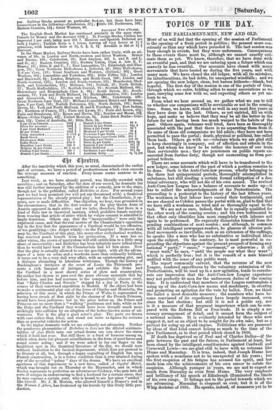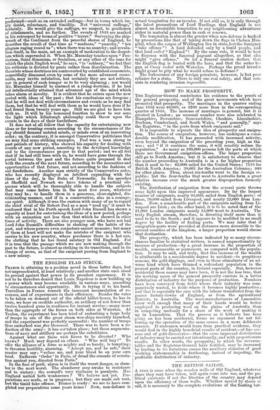TOPICS OF THE DAY.
ME PARLIAMENT-MEN, NEW AND OLD.
Mon of us will feel that the opening of the session of Parliament is the opening of a fresh period in politics ; the present more con- sciously so than any which have preceded it. The last session was
busy enough in events, but they were unforeseen. Consequences to those events there must be, although we cannot exactly esti_
mate them as yet. We know, therefore, that we have done with
an eventful past, and that we are entering upon a future which can scarcely be less eventful. Our accounts have closed with many
movements that have busied us during the five years, and with many men. We have closed the old ledger, with all its mistakes, its interlineations, its bad debts, its unexpected windfalls ; and we
are opening the new ledger, clean, but barren hitherto—blank, but hopeful. The first day of hie session is one of the portals of time, through which we enter, bidding adieu to many associations as we pass, carrying some few with us, and expecting others as yet un- born to us.
From what we hear around us, we gather what we can to tell us whether our companions will be serviceable or not in the coming time. Some, we know, will stand as well in any next five years as they have done in the last. Others, as yet untried, fill us with hope, and make us believe that they may be all the better in the
future for not having been too much warped to the habits of the past. Others again, veterans well tried, have been so thoroughly associated with the past that there is no separating them from it. To some of those old companions we bid adieu; they have not been permitted to pass the portal; death, physical or political, has called them back. Others go with us—veterans whom we are glad still to keep cheeringly in company, out of affection and esteem in the past, but whom we know to be rather the honours of our train than serviceable men ; they are pensioners on public repute ex- onerated from further duty, though not exonerating us from per- petual tribute. There are some accounts which will have to be transferred to the new ledger, some labours of the past of which a portion remains to be done. such is the Anti-Corn-law process, wholly belonging to the three last quinquennial periods, thoroughly accomplished in substance, but still needing a certain formal extirpation of a doc- trinal adversary, who will not die of his own accord. The revived Anti-Corn-law League has a balance of accounts to make up—it has to collect the acknowle, ents of the Protectionists. The proceeding is a postscript to t.e history of the last fifteen years. The workmen in that labour have earned their testimonials, and we are cheered as Cobden passes the portal with us, glad to find that we have still a workman so tried and so thoroughly equal to the task. We are not so sure, indeed, that he is equally. qualified for the other work of the coming session ; and his own testimonial to that effect only identifies him more completely with labours not again to be performed. He expressly dissociates himself from the pending combinations of next session : and although, in common with all intelligent newspaper-readers, he glances at ulterior poli- tical movements as inevitable, such as an extension of the suffrage, he speaks like a man who has no substantive or individual ideas upon the subject. On the contrary, he is most powerful in ex- pounding the objections against the present prospect of forming any national " party, " cause," " movement," or otherwise ; it all " must wait," he says, " until the people say what they want": which is perfectly tree; but it is the remark of a man himself unfilled with the sense of any public want.
The report commonly current, that the revenue of the new League, rendered superfluous by the voluntary submission of the Protectionists, will be used up in a new agitation, tends to corrobo- rate our impression that the Anti-Corn-law League experience may not perfectly fit men for the unforeseen duties of the coming time. It is understood that members of the League contemplate a using up of the Anti-Corn-law means and machinery, in creating and promoting an agitation for the vote by ballot. Now, we think the ballot a most desirable measure ; the numbers who have be- come convinced of its expediency have largely increased, even since the last election; but still it is not a public cry, nor is it a measure of that pregnant importance which can be com- pared with the Reform Bill or Free-trade. It is simply a ne- cessary arrangement of detail, and it cannot form the subject of a national acclaim. It is evidently intended by those who now suggest it, not as an object to be sought for its own sake, but as a pretext for using up an old engine. Politicians who are possessed by ideas of that kind cannot belong so much to the time of the new Parliament, as to that period which closed in 1846. If death has deprived us of Peel and of Charles Buller—if the gate between the past and the future, in Parliament at least, has been closed by the intelligent constituencies against Cardwell and Cornewall Lewis—we are glad still to have with us veterans like Hume and Macaulay. It is true, indeed, that Joseph Hume has spoken with a weariness not to be unexpected at his years ; but the first suspicion of his fatigue has aroused his spirit, and has made him cite the achievements of his own career to refute the suspicion. Although younger in years, we are not to expect so much from Macaulay as even from Hume. The very emphasis and brilliancy of his speech at Edinburgh illuminated the limits of his own range. It belongs not to the period towards which we are advancing. Macaulay is eloquent as ever, but it is of the Whig doctrine of 1831. He speaks, indeed, of measures yet to be
performed—such as an extended suffrage—but in terms which im- ply doubt, reluctance, and timidity. Not " universal suffrage," certainly. He would the suffrage, we suspect, to gentlemen of attainments, and no further. The events of 1848 are marked in his retrospect by terms of positive " terror." Surveying the ship- wreck of the Continent from the peaceful shores of England, he describes the revolt of that time as "madness," "anarchy," "ten plagues raging round us " ; when there was no anarchy; and revolu- tion itself, in the main, set an example of moderation to the despot- ism which superseded it. When Mr. Macaulay touches upon " Fou- rierism Saint Simonism, or Socialism, or any other of the isms for
which Fou- rierism, plain English word," he says, "is robbery,' "we feel that his criticism is dictated by panic rather than discrimination. The theorists whose doctrines are controverted by established economists, respectfully discussed even by some of the more advanced econo- mists, may invite refutation, but certainly they are not robbers, nor in general of such temper as to be very alarming ; nor would Mr. Macaulay himself be alarmed at a rising doctrine, if he had not intellectually attained that advanced age of the mind which takes alarm at novelty. It is evident that he enters upon the new period with ideas of the past ; that his conclusions are foregone ; that he will not deal with circumstances and events as he may find them, but that he will deal with them as he would have done if he had found them twenty years ago. Still we are glad to have him with us. It will be his honoured function to show to our sons the light which Edinburgh philosophy could throw upon the events in the days of their forefathers.
It does not at all follow that the capacity for entertaining new ideas or for treating events according to the circumstances of the day should demand untried minds, or minds even of an innovating order; on the contrary, it is amongst Conservative politicians that we may find some striking examples. Peel was a man strong in past periods of history, who showed his capacity for dealing with events of any new period, according to the developed knowledge and to the circumstances proper to that period; and we all feel that if he had still been with us, he would have gone through the portal between the past and the future quite prepared to deal with the events of the next future, according to the necessities and opportunities of that future, and not according to the fashions of our forefathers. Another man strictly of the Conservative order, who has recently displayed an intellect expanding with the ideas of the day, is the Duke of Newcastle. In his speeches at Sheffield and Newark we have tokens of a practical elo- quence which will be thoroughly able to handle the subjects that may come before him in the next five years, whatever they may be ; to handle them in a generous, clear-sighted, dis- criminating manner, and if in a conservative, also in a courage-, ous spirit. Although it was the custom with many of us to regard the chief rival of Sir Robert Peel as a man " used up," it must be confessed that in his Perth speech Lord John Russell has shown a capacity at least for entertaining the ideas of a new period, perhaps with an animation not less than that which he showed in other times of activity. There are also younger men, who have not had Lord John Russell's difficulties in shaking of the habits of the past, and whose powers even conjecture cannot measure; but many of them at least will not make the mistake of the emigrant who carries to his new country, where perchance there is a hot sun, the clothing that he has found salutary in Old England. For it is true that the passage which we are now making through the past to the future, is almost as striking in its transitions, and in its change of scene, as that of the emigrant passing from England to a new colony.



























 Previous page
Previous page